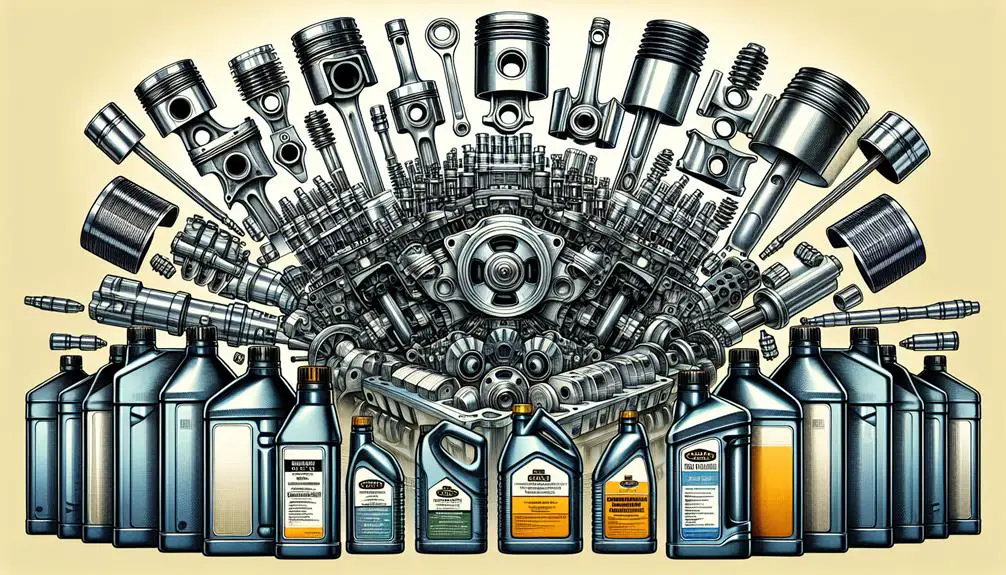If you've ever wondered about the complexities of selecting the best synthetic oil for high-performance engines, there are key factors that can greatly impact your engine's efficiency and longevity. Exploring the world of synthetic oils can be daunting, but understanding the nuances between different brands and formulations is essential for top engine performance. From viscosity grades to additive packages, each component plays an important role in ensuring your high-performance engine runs smoothly. Stay tuned to uncover the essential considerations that will guide you in making an informed choice for your engine's well-being.
Key Takeaways
- Consider the recommended viscosity grade for optimal engine protection and lubrication.
- Evaluate the additive package for wear, deposits, and oxidation protection.
- Select high-quality base oils (Group III, IV, or V) for stability and extreme condition performance.
- Look for industry certifications like API and ILSAC for quality assurance.
- Tailor the choice based on driving conditions for peak engine performance.
Synthetic Vs. Conventional Oils: Overview

When deciding between synthetic and conventional oils for your high-performance engine, understanding the key differences is essential.
Synthetic oils are engineered in a lab, offering superior performance and protection compared to conventional oils refined from crude oil. One major advantage of synthetic oils is their ability to withstand extreme temperatures without breaking down, providing better lubrication and engine protection. Additionally, synthetic oils have fewer impurities, leading to less sludge buildup and cleaner engines overall.
Conventional oils, while cheaper, may not offer the same level of performance and protection as synthetic oils, especially in high-stress situations. They're more prone to viscosity breakdown at high temperatures, which can lead to engine wear and reduced efficiency. However, if you're on a tight budget or don't push your engine to its limits regularly, conventional oil could still be a viable option for your high-performance vehicle.
In the end, the choice between synthetic and conventional oils boils down to your engine's needs and your driving habits. For those seeking superior performance and protection, synthetic oils are the way to go.
Performance Benefits of Synthetic Oils
Synthetic oils offer unparalleled performance benefits for high-performance engines, surpassing conventional oils in lubrication and engine protection. These advanced oils provide superior protection against wear, heat, and deposits, ensuring your engine runs smoothly and efficiently. Here are some key performance benefits of synthetic oils:
| Performance Benefits | Description |
|---|---|
| Enhanced Lubrication | Synthetic oils have a more consistent molecular structure, reducing friction for better engine performance. |
| Improved Temperature Stability | They can withstand higher temperatures without breaking down, providing reliable lubrication even in extreme conditions. |
| Superior Engine Cleanliness | Synthetic oils contain fewer impurities, resulting in cleaner engines with reduced sludge buildup and enhanced overall performance. |
| Extended Oil Change Intervals | Due to their enhanced durability, synthetic oils can often last longer between oil changes, saving you time and money. |
Factors to Consider When Choosing

Consider the specific requirements of your high-performance engine when selecting the best synthetic oil for peak performance and protection. High-performance engines demand oils that can handle extreme temperatures, reduce friction, and provide superior lubrication.
One essential factor to take into account is the viscosity grade recommended by the manufacturer for your engine. Different engines require specific viscosity grades to guarantee peak performance and protection.
Additionally, look for synthetic oils with additives designed to enhance engine cleanliness, prevent sludge buildup, and prolong the oil's life.
Another important consideration is the oil's ability to maintain its properties under high-stress conditions, such as during intense acceleration or prolonged periods of high speeds.
Moreover, think about any special requirements your engine may have, such as compatibility with certain fuel types or the need for a particular synthetic oil formulation.
Top Synthetic Oil Brands Reviewed
Now let's check out the top synthetic oil brands reviewed for high-performance engines.
You'll find detailed insights on their top performance ratings and a comparison of key features.
This information will help you make an informed decision when selecting the best synthetic oil for your high-performance vehicle.
Top Performance Ratings
Reviewing top synthetic oil brands reveals the best performers for high-performance engines. When it comes to getting the most out of your engine, these top synthetic oil brands are known for their exceptional performance:
- Mobil 1: Known for its superior protection and performance under extreme conditions.
- Royal Purple: Renowned for reducing wear and maximizing horsepower.
- Castrol Edge: Trusted for its strength under pressure and ability to minimize friction.
- Pennzoil Platinum: Noted for its excellent cleansing properties and overall engine protection.
- Valvoline SynPower: Recognized for its high-temperature stability and engine efficiency.
These top-rated synthetic oils have been tested and proven to deliver outstanding results for high-performance engines, ensuring that your engine runs smoothly and efficiently. Whether you're pushing the limits on the track or just want peak performance on the road, these brands have got you covered.
Key Features Comparison
Comparing key features of the top synthetic oil brands for high-performance engines reveals distinct advantages in protection and performance.
When evaluating synthetic oils for your high-performance engine, look for key factors such as viscosity, additives, and compatibility with your engine's requirements.
Brands like Mobil 1 boast advanced additives that provide superior protection against wear, deposits, and sludge buildup, ensuring your engine performs at its best.
Royal Purple stands out for its high film strength and thermal stability, ideal for extreme driving conditions.
If you prioritize fuel efficiency, consider Pennzoil Platinum, known for its ability to improve fuel economy while maintaining engine cleanliness.
On the other hand, Valvoline SynPower offers excellent protection against heat and friction, extending the life of your engine.
Each top synthetic oil brand brings unique features to the table, so choose one that aligns with your engine's needs for best performance and protection.
Synthetic Oil Maintenance Tips

When it comes to maintaining your high-performance engine with synthetic oil, remember to pay attention to the frequency of oil changes.
Synthetic oil offers numerous benefits, such as improved engine protection and performance.
Oil Change Frequency
To maintain peak performance in your high-performance engine, it's essential to adhere to a consistent synthetic oil change schedule. Keeping your oil fresh and clean is essential for peak engine function.
Here are some tips to help you determine the right frequency for oil changes:
- Follow Manufacturer Recommendations: Check your vehicle's manual for the recommended oil change intervals.
- Monitor Your Driving Habits: If you drive aggressively or in extreme conditions, you may need more frequent oil changes.
- Regular Inspections: Periodically check your oil level and condition to ensure it's still effective.
- Use Oil Life Monitoring Systems: Some vehicles come equipped with systems that monitor oil condition and alert you when it's time for a change.
- Trust Your Instincts: If your engine feels sluggish or you notice odd noises, don't hesitate to change the oil sooner than scheduled.
Benefits of Synthetic
Enhance the longevity and performance of your high-performance engine by implementing these synthetic oil maintenance tips. Synthetic oil offers numerous benefits that can help your engine perform at its best. To begin with, synthetic oil has superior thermal stability, meaning it can withstand high temperatures without breaking down, providing better protection for your engine components.
Additionally, synthetic oil flows more easily at low temperatures, ensuring quicker engine startup and reduced wear during cold starts.
Regularly changing your synthetic oil according to the manufacturer's recommendations is essential to maintaining its effectiveness. Synthetic oil doesn't break down as quickly as conventional oil, but it still needs to be replaced to prevent buildup of contaminants and maintain peak engine performance.
Moreover, using a high-quality oil filter designed for synthetic oil can help extend the life of your engine by effectively trapping dirt and debris.
Conclusion: Making an Informed Choice
Consider your specific vehicle's needs and the level of performance you require when selecting the best synthetic oil for high-performance engines.
To make an informed choice, here are some key points to keep in mind:
- Viscosity Grade: Confirm that the synthetic oil you choose matches the viscosity grade recommended by your vehicle's manufacturer for peak engine performance.
- Additive Package: Look for synthetic oils with a robust additive package that provides enhanced protection against wear, deposits, and oxidation.
- Base Oil: Opt for synthetic oils formulated with high-quality base oils, such as Group III, IV, or V, for superior stability and performance under extreme conditions.
- Certifications: Check for industry certifications like API (American Petroleum Institute) and ILSAC (International Lubricants Standardization and Approval Committee) to ensure the oil meets stringent quality standards.
- Driving Conditions: Take into account your typical driving conditions – whether you engage in high-speed driving, towing heavy loads, or driving in extreme temperatures – and select a synthetic oil that suits these scenarios for maximum engine protection.
Frequently Asked Questions
Can Synthetic Oil Improve Fuel Efficiency in High-Performance Engines?
Using synthetic oil can indeed boost fuel efficiency in high-performance engines. It helps reduce friction in engine components, allowing them to work more smoothly and efficiently.
This smoother operation can lead to improved fuel economy, especially in engines that demand high performance. So, if you're looking to maximize your fuel efficiency in your high-performance vehicle, switching to synthetic oil could be a smart move.
Are There Any Compatibility Issues When Switching to Synthetic Oil?
When you switch to synthetic oil, compatibility issues can arise if the new oil doesn't mix well with any remnants of conventional oil left in your engine. This can lead to decreased performance and potential damage.
To avoid problems, it's recommended to fully flush the engine before switching to synthetic oil.
Always check your vehicle's manual for guidance on compatible oils to guarantee a smooth shift and peak engine performance.
How Does Synthetic Oil Affect Turbocharged Engines?
Switching to synthetic oil in turbocharged engines can improve overall performance. Synthetic oils handle high temperatures better, reducing the risk of oil breakdown and sludge formation. This helps maintain ideal lubrication levels, leading to smoother engine operation and potentially increased horsepower.
Additionally, synthetic oils often have better flow properties, which can benefit turbocharged engines by ensuring proper lubrication even in extreme conditions. Consider switching to synthetic oil for your turbocharged engine's well-being.
Is It Necessary to Use a Specific Synthetic Oil for Racing Applications?
You might wonder if it's important to opt for a designated synthetic oil for racing.
The answer is yes. Racing applications demand oils that can handle extreme conditions and provide peak performance.
Using a specialized synthetic oil formulated for racing guarantees that your engine operates at its best, delivering the power and protection needed during high-stress situations.
Can Synthetic Oil Extend the Lifespan of High-Performance Engine Components?
Using synthetic oil can definitely extend the lifespan of high-performance engine components. It offers better protection against heat and friction, keeping your engine running smoothly.
Regular oil changes with a high-quality synthetic oil can help prevent wear and tear on critical parts, ensuring your engine performs at its best for longer.
Conclusion
As you navigate the road of engine protection and performance, keep in mind that selecting the best synthetic oil is like choosing the perfect suit for a special occasion.
Just like a well-tailored suit enhances your appearance, the right synthetic oil can boost your engine's performance and longevity.
So, make sure to evaluate all the factors and choose wisely, ensuring your engine runs smoothly and efficiently for years to come.
Happy driving!
